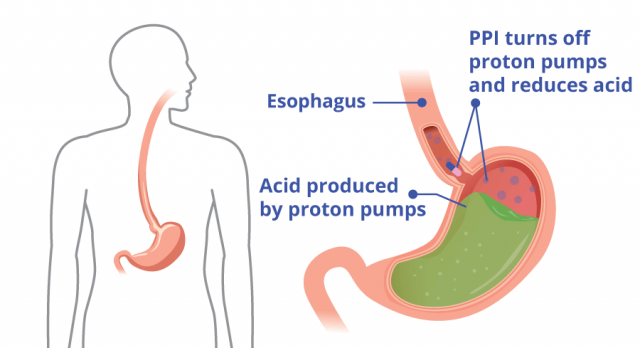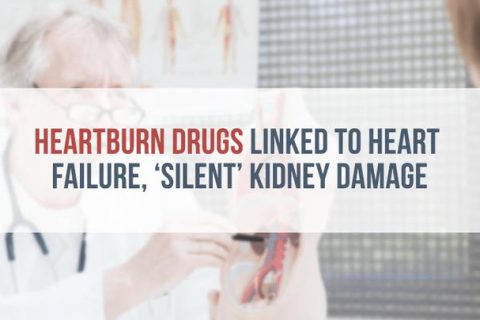Proton Pump Inhibitors (PPIs)
Proton pump inhibitors (PPIs) treat certain gastrointestinal disorders. They reduce the amount of acid in the stomach. PPI drugs are available over the counter (OTC) and in prescription form. PPIs can cause life-threatening side effects. There are thousands of lawsuits over proton pump inhibitors.
Proton pump inhibitors (PPIs) are among the most commonly used drugs in the world. About 15 million people in the U.S. use PPIs every year.
People take PPI drugs to treat gastrointestinal symptoms like frequent heartburn. But studies suggest as many as 70 percent of people taking PPIs get no benefit from them.
Some people may be able to try alternatives to PPIs like lifestyle changes or H2 blockers.
For those who take PPI drugs long-term, side effects can be serious or even deadly. Proton pump inhibitor side effects include kidney problems, bone fractures and heart attacks.
Thousands of people have filed PPI lawsuits. They claim PPIs caused kidney failure and other injuries.
How Do Proton Pump Inhibitors Work?
Proton pump inhibitors, or PPIs, work by limiting the amount of acid that proton pumps in the stomach produce. By lowering stomach acid levels, PPIs treat frequent heartburn and more serious gastric acid-related conditions.

The body absorbs proton pump inhibitors into the bloodstream. From there, they send signals to the acid-forming cells in the stomach lining. These tell the cells to reduce the amount of acid they produce.
List of PPI Brand Names vs. Generics Available in the U.S.
There are eight brand name proton pump inhibitors in the U.S.
All PPI drugs are available in prescription strength. Nexium, Prilosec and Prevacid come in over-the-counter (OTC) versions, too.
PPI brands except Dexilant and Vimovo can be found in generic forms. Pediatric versions are available for Prilosec, Nexium, Prevacid, Zegrid and AcipHex.
Proton Pump Inhibitors List: Available Prescription, OTC & Generic PPIs
- Omeprazole (Prilosec, Prilosec OTC, Zegerid)
- Esomeprazole (Nexium, Nexium 24HR)
- Lansoprazole (Prevacid, Prevacid 24HR)
- Dexlansoprazole (Dexilant)
- Pantoprazole (Protonix)
- Rabeprazole (AcipHex)
- Esomeprazole/ Naproxen (Vimovo)
What Are PPIs Used to Treat?
Prescription proton pump inhibitors treat serious gastric acid-related conditions. Over-the-counter PPIs treat frequent heartburn.
- Gastroesophageal reflux disease (GERD)
- A chronic digestive disorder caused when stomach acid flows back into the esophagus
- Helicobacter pylori (H. pylori)
- A type of bacteria usually found in the stomach
- Zollinger-Ellison syn
- A rare condition that causes the stomach to produce too much acid
- Erosive esophagitis (EE)
- A condition characterized by inflammation of the lining of the esophagus
- Gastric and duodenal ulcers
- A raw place or sore in the lining of the stomach or intestine
Proton Pump Inhibitors OTC
Over-the-counter PPIs include Nexium 24HR and Prilosec OTC. These PPIs treat frequent heartburn.
Frequent heartburn is heartburn that happens two or more times a week. PPIs do not provide immediate heartburn relief. They may need several days to begin working.
People should not take OTC proton pump inhibitors for more than two weeks at a time. They should wait at least four months before taking them again.
PPI Off-Label Uses
Taking OTC proton pump inhibitors longer than indicated on their label is an off-label use. The FDA has not approved this. But it acknowledges that doctors may recommend taking OTC proton pump inhibitors for more than 14 days.
“FDA acknowledges that consumers, either on their own, or based on a healthcare professional’s recommendation, may take these products for periods of time that exceed the directions on the OTC label. This is considered an off-label (unapproved) use.”
Prescribing PPIs to infants is another off-label use. PPIs are not approved for babies younger than 1 month of age.
Studies have shown this practice may be ineffective. It is also associated with an increased risk of asthma and allergies. Other studies have linked PPIs to childhood bone fractures.
Dosage Information on Proton Pump Inhibitors
Dosage varies with each PPI and the condition it is being used to treat. A doctor will advise a patient on the dose needed and how often a patient should take a PPI drug. Dosages may start at 15 mg per day. Doctors have prescribed doses up to 240 mg per day.
When Should I Take a PPI?
Patients should ask their doctor when to take a PPI. Generally, doctors tell patients to take PPIs on an empty stomach — about 30 minutes before a meal. Often this will be first thing in the morning. Some patients take a second dose before dinner when a doctor deems it necessary.
PPI Side Effects
Proton pump inhibitor side effects range from minor to life-threatening. The most common side effects include constipation, headache, diarrhea and vomiting. Some of the most serious PPI side effects involve a range of kidney problems. These include kidney failure — also called end stage renal disease (ESRD).
PPI Interactions
Proton pump inhibitors may cause drug interactions with 290 other medicines. Some of these may be minor. But some PPI interactions can be serious or even life-threatening.
People should tell their doctor about all other drugs they are taking before using PPIs. They should ask their doctor whether they should be taking PPI drugs at all.
What Are the Differences Among PPI Drugs?
Studies tend to show that all PPIs are about the same in most cases. But their costs can vary widely.
Some PPIs may be more effective than others at treating certain conditions. And some may present a greater risk for certain side effects.
A 2022 study reviewed research comparing several PPIs.
How Does Nexium Compare to Other PPIs?
Nexium (esomeprazole) is as effective as other PPIs in most treatments. Studies have found it may be better than other PPIs at healing esophagitis at four to eight weeks. This applied only to moderate to severe cases.
How Do Prilosec and Aciphex Compare to Other PPIs?
A study found Prilosec (omeprazole) and Aciphex (rabeprazole) performed better than other PPI drugs at controlling GERD. Prilosec and Aciphex worked better than other PPIs in high doses. Another study found older patients with esophagitis responded better to the Prilosec and Aciphex than they did to other PPIs.
How Does Protonix Compare to Other PPIs?
A 2016 study found Protonix users faced a greater stroke risk than users of other PPIs. Researchers found overall PPI use increased stroke risk by 21 percent. But the risk for Protonix users was highest at 94 percent.
How Does Vimovo Compare to Other PPIs?
Vimovo is unique in that it combines a PPI with a pain reliever. It contains the active ingredients of both Nexium (esomeprazole) and Aleve (naproxen). It is also the most expensive proton pump inhibitor in the U.S. According to CNN, a month’s supply of the prescription drug cost more than $3,000 in early 2018. A month’s supply of the OTC versions of both Nexium and Aleve cost about $36 a month.
Calling this number connects you with a Drugwatch.com representative. We will direct you to one of our trusted legal partners for a free case review.
Drugwatch.com's trusted legal partners support the organization's mission to keep people safe from dangerous drugs and medical devices. For more information, visit our partners page.



